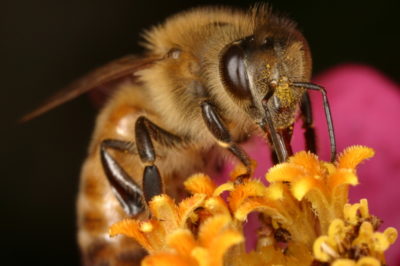Pesticide warning labels to help save the bees finally have been approved by the Environmental Protection Agency.
While the EPA has taken a small step in the right direction, it may not be enough to save the drastically shrinking honeybee population. Approximately 70 percent of the food consumed worldwide is pollinated by bees.
The labels will prohibit the use of some neonicotinoid pesticide products where bees are present. Labels must contain an advisory box and icon “with information on routes of exposure and spray drift precautions,” according to the EPA. The warning label affects the following neonicotinoids: imidacloprid, dinotefuran, clothianidin and thiamethoxam.
The warning label approval came just after the release of a report by the European Food Safety Authority (EFSA) detailing the “high acute risks” to bees when exposed to pesticide residues and dusts in pollen and nectar. As previously reported by Off The Grid News, the European Commission recently passed new regulations and restrictions on neonicotinoids.
“Based on currently available data,” the EPA says on its website, “the EPA’s scientific conclusions are similar to those expressed in the EFSA report with regard to the potential for acute effects and uncertainty about chronic risk. However, the EFSA report does not address risk management, which, under US federal law, is a key component of the EPA’s pesticide regulatory scheme.”
Although the EPA agreed with much of the European scientific report, the US federal agency opted not to ban pesticides which contain neonicotinoids.
“Multiple factors play a role in bee colony declines, including pesticides. The Environmental Protection Agency is taking action to protect bees from pesticide exposure and these label changes will further our efforts,” said Jim Jones, assistant administrator for the EPA’s Office of Chemical Safety and Pollution Prevention.
The Ultimate Guide to Keeping Stronger Colonies and Healthier, More Productive Bees
Monsanto, Syngenta, Dow, DuPont, and Bayer are all major chemical pesticide and GMO seed producers. Monsanto reportedly uses neonicotinoids during the seed-producing process, on corn crops in particular. According to a Mother Jones report, 92 percent of corn seeds are coated with Bayer’s “bee decimating” pesticide or similar products from the company’s competitors. Because GMO seeds have virtually taken over the marketplace, farmers are finding it far more difficult to purchase organic heirloom seeds. Even those farmers and gardeners who go the extra mile and purchase non-GMO are not assured that their crop will remain pesticide-free. Natural weather fluctuations such as flooding and wind, and the neonicotinoid residue carried by the bees themselves, can damage healthy organic crops.
There are several ways bees are impacted by neonicotinoids:
- By gathering clothianidin-laced corn pollen which in turn will be fed to their larva.
- By flying through planter dust which has been contaminated with clothianidin.
- Consuming water from guttation droplets which have been contaminated with toxic pesticides.
- By gathering nectar and pollen from fields where wild flowers such as dandelions grow and have been subjected to soil contamination from pesticide use.
Neonicotinoids are not only though to kill bees, but birds as well. American Bird Conservancy pesticides program manager Cindy Palmer recently co-authored a report which revealed that a single corn kernel coated with a neonicotinoid can kill a bid. Palmer also stated that a grain of canola or wheat treated with imidacloprid can also be deadly to a bird. The EPA neonicotinoids warning labels and bee information boxes might protect some bees, but will continue to leave birds vulnerable.
Friends of the Earth said the EPA’s action was a good start, but not enough.
“We must take immediate action to address this crisis,” Friends of the Earth said. “Europe has banned bee-harming pesticides, retailers in the UK are refusing to sell them, and stores like Home Depot and Lowe’s have a moral obligation to make the same commitment here in the US. In the meantime, gardeners should start their plants from untreated seeds or choose organic plants for their gardens.”
The Pesticide Research Institute and Friends of the Earth are pressuring Home Depot, Lowe’s and others to stop selling “bee friendly garden plants” that reportedly are pre-treated with various pesticides and neonicotinoids – bee-killers. More than 175,000 people have signed petitions urging the stores to take action.
“Our investigation is the first to show that so called ‘bee-friendly’ garden plants contain pesticides that can actually poison bees, with no warning to gardeners,” Lisa Archer, director of the Food and Technology Program at Friends of the Earth in a news release. “Bees are essential to our food system and they are dying at alarming rates. Neonic pesticides are a key part of the problem we can start to fix right now in our own backyards.”
The Environmental Protection Agency is reportedly studying the impact chemical pesticides have on honeybees, although the research may not be completed until 2018.
 Off The Grid News Better Ideas For Off The Grid Living
Off The Grid News Better Ideas For Off The Grid Living





